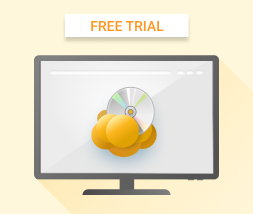Many backup and disaster recovery (BDR) vendors in the market host backups in their own clouds. While this doesn’t sound like a big deal, it can be, especially when considering control, security, and pricing.
By decoupling cloud storage from its BDR solution, MSP360 puts its customers in control of where their backups reside, giving them additional insights into security and pricing.
We provide support for more than 20 public cloud storage providers, including AWS, Microsoft Azure, Google Cloud Platform, Backblaze B2, Wasabi, and more.
Being able to control your backups enables you to protect data from an ever-increasing threat landscape and unexpected price hikes.
Who Controls Your Data When It’s in “the Cloud”?
“The cloud” is such an abstract concept when you think about it.
You’re told your data is stored in the cloud, but what does that even mean? Where exactly is the cloud? Who has access to it? How is your data being protected? Who’s in charge of securing it?
Even when the BDR vendor you’ve contracted with has a cloud of its own, one question remains unresolved: Are you or your vendor responsible for the data?
For example, if you’re unable to sustain data compliance and your company is fined for it, who’s coughing up the money? You or your vendor? If you’re unsure, here’s the thing: Your vendor isn’t.
To avoid this uncertainty, choose a BDR vendor with a storage-agnostic approach.
When you do this, instead of being constrained by a vendor’s cloud, you’re able to decide where your backups are stored — and this can make a huge difference in your security measures.
What Are the Security Benefits to Bring Your Own Cloud (BYOC)?
From a security perspective, being able to control where your backups are stored is not only beneficial but essential.
Oftentimes, backups — especially if the data is from medical practices or financial services providers — contain overly sensitive data (also known as protected health information (PHI) or personally identifiable information (PII), which must be protected with the proper safeguards in place. If not, there could be dire legal consequences, including significant fines.
Further reading HIPAA-Compliant Cloud Backup
Therefore, it’s so crucial to truly understand where and how your backups are stored.
Instead of locking you into a relationship with a subpar cloud storage provider, MSP360’s products enable MSPs or customers to choose where they'd like their backups to live. This storage-agnostic approach not only provides you with options but control, which comes in handy in an ever-evolving threat landscape.
Cybersecurity threats are expected to rise. (Why wouldn’t they when cybercrime is estimated to be a $1.5 trillion industry?) Of course, this means there’s a strong possibility a cybercriminal will attempt to hack into the cloud where your backups are being stored; however, if your data resides in a public cloud — such as AWS — the hacker is less likely to know what’s waiting in an S3 bucket than a backup vendor's cloud, where the likelihood of backup data of multiple customers is high.
While security is a top concern for many, so is pricing.
Now, What About Pricing?
BDR vendors with their own cloud control pricing, too.
Raw cloud storage prices typically go down over time but vendors with their own clouds typically raise prices annually. When there’s no competition, these companies can raise their prices whenever they want, and there’s nothing you can do about it.
Prevent this from happening to you by, again, partnering with a BDR with a storage-agnostic approach to backup. When the cost of the SaaS software and the data storage "cloud" are separate, you have much more choice and freedom.






